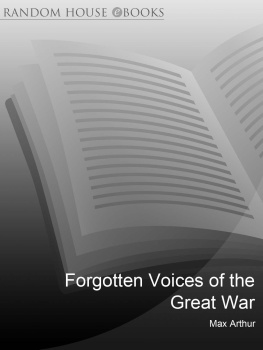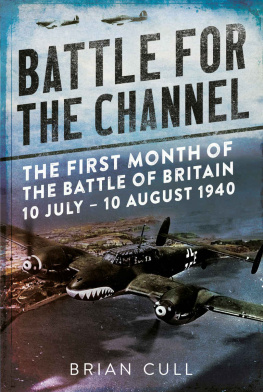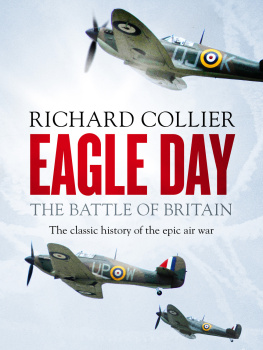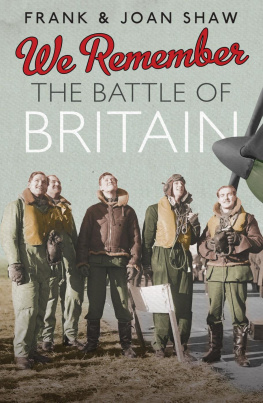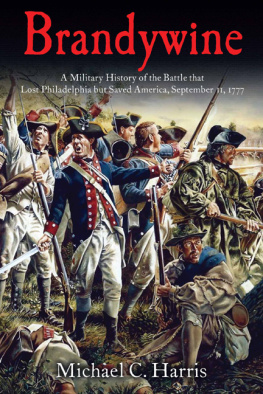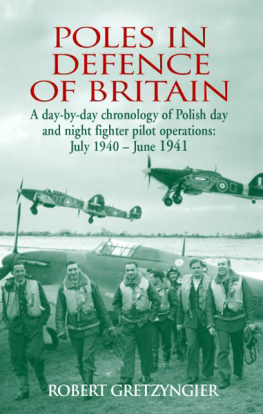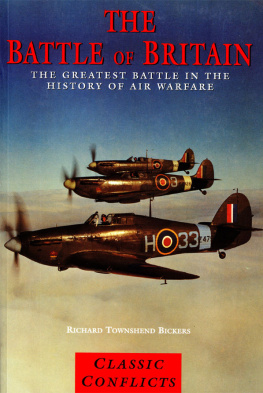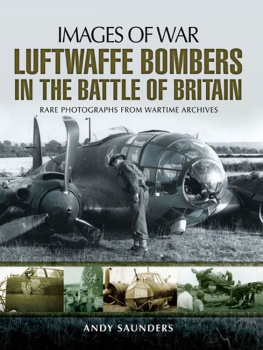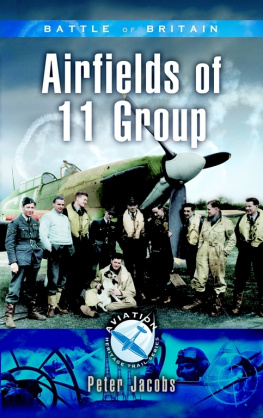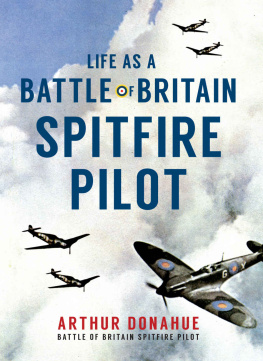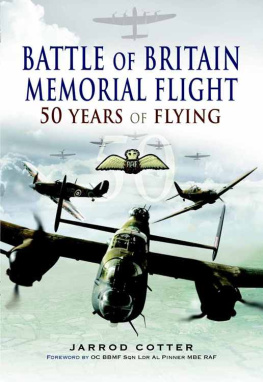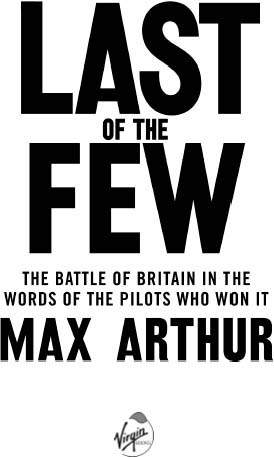C ONTENTS
About the Book
After the fall of France in May 1940, Britain stood alone to face Hitlers inevitable invasion attempt. Within weeks, he had assembled a vast fleet ranged along the French coast. But before the German Army could land across the Channel, Hitler needed to achieve mastery of the skies. His biggest obstacle, the small and under-resourced Royal Air Force would have to be broken.
And so began the Battle of Britain: thirteen terrifying weeks which saw 2,500 young RAF pilots pitted against the larger and more experienced German forces of the Luftwaffe high above the English Channel.
During that fateful summer, Britains air defences were badly battered and nearly broken, but against all odds, The Few, as they came to be known, bought Britains freedom many with their lives.
These are the personal accounts of the pilots who fought and survived that battle. Their stories are as riveting, as vivid and as poignant as they were seventy years ago.
Lauded by Churchill as The Few The survivors of that campaign are now in their eighties or nineties, their ranks thinning by the year Max Arthur brings together the voices of the living and the dead to recreate the events of JulyOctober 1940, when vapour trails against a blue sky marked the battle to save civilisation Daily Telegraph
Entertaining and moving This is a brilliant introduction for anyone seeking to understand the origins and outcomes of the battle. A dramatic tale, well told News of the World
No one can relive the battle except the men who fought it, and here they are in a tide of telling testimony expertly tracked down and anthologised by out foremost oral historian of war, the self-effacing Max Arthur Read it and remember. Daily Mail
Also by Max Arthur
Above All Courage: First-hand Accounts from the Falklands Front Line
The Busby Babes: Men of Magic
Faces of World War I
Forgotten Voices of the Great War
Forgotten Voice of the Second World War
Last Post: The Final Words from our First World War Soldiers
Lost Voices of the Edwardians
Men of the Red Beret: Airborne Forces 19401990
Northern Ireland: Soldiers Talking
Symbol of Courage: The History of the Victoria Cross
There Shall be Wings The RAF: 1918 to the Present (now published as Lost Voices of the Royal Air Force)
The True Glory: The Royal Navy, 19141939
and
The Navy: 1939 to the Present Day
(now combined and published as Lost Voices of the Royal Navy)
When This Bloody War Is Over: Soldiers Songs of the First World War
Dambusters: A Landmark Oral History
The Real Band of Brothers: First-hand Accounts from the last British
Survivors of the Spanish Civil War
We Will Remember Them: Voices from the Aftermath of the
Great War: Memories of Our First World War Soldiers
This book is dedicated to The Few and those on the ground who supported them. We owe them an incalculable debt.
A UTHORS N OTE
For Last of the Few I have listened to hours of recorded interviews and read a number of personal testimonies, and interviewed many of the pilots who fought in the Battle of Britain. Throughout the book I have given some historical background, but the heart of the book lies in the personal accounts of those who fought and witnessed the battle. The accounts are not necessarily in chronological order and the ranks given are the ranks at the time. Through their words I have sought to capture the experiences and atmosphere of the battle: the waiting, the action and the consequences of those actions.
These are their words I have been but a catalyst.
Max Arthur
L IST OF A BBREVIATIONS
AAF | Auxiliary Air Force |
AOC | Air Officer Commanding |
CID | Criminal Investigations Department |
CO | Commanding Officer |
DF | Direction Finding |
Do | Dornier |
FT | Flying Training |
FTS | Flying Training School |
He | Heinkel |
Ju | Junkers |
LDV | Local Defence Volunteer (Home Guard) |
LMP | lack of moral fibre |
Me | Messerchmitt |
MTB | Motor Torpedo Boat |
MU | Maintenance Unit |
NAAFI | Navy, Army and Air Force Institutes |
OTU | Officers Training Unit |
POW | prisoner of war |
prop | propeller |
RAF | Royal Air Force |
RAFVR | Royal Air Force Volunteer Reserve |
RCAF | Royal Canadian Air Force |
RFC | Royal Flying Corps |
RT | radio transmitter |
VR | Volunteer Reserve |
WAAF | Womens Auxiliary Air Force |
An Air Administration map showing the air defences of South East England and the Midlands
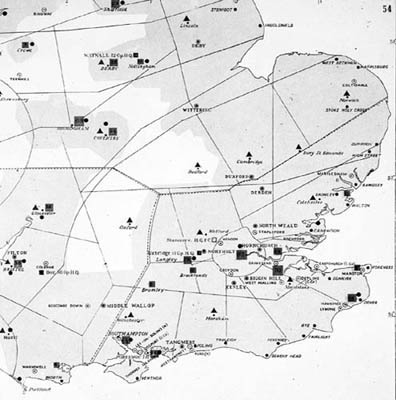
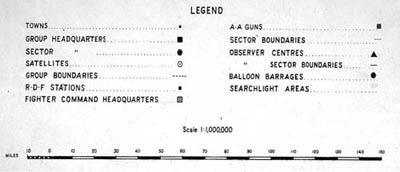
Courtesy of The National Archives UK
I NTRODUCTION
During the First World War the Royal Flying Corps (RFC) had proved the value of air reconnaissance and bombing raids over the battlefields of France and Belgium and in return, cities in Britain had come under air attack from German Zeppelin airships. The future of warfare had been changed for ever.
The aircraft of the Royal Air Force (RAF) officially named as such on 1 April 1918 were unsophisticated biplanes. Clearly, the aircraft deployed in any future conflict would be very different machines, but in the years after the Great War, aircraft development was slow. The Treaty of Versailles which dictated the terms of peace had effectively prevented Germany from developing any armed strength and the Allies retired to recover from their devastating losses. Sir Hugh Trenchard, a former pilot, became marshal of the new RAF, and it was his vision that shaped the role of the aeroplane in future conflict. He saw aircraft as an offensive tool, taking the war to the heart of enemy territory with bombing raids against communications, production and transport centres so he ordered increased production of bombers. Fighters, he felt, were a sideshow a presence to boost the morale of the populace as they came under air attack. As politician Stanley Baldwin declared in 1932, The bomber will always get through.
It was therefore fortuitous that Air Marshal Sir Hugh Dowding, Air Member for Research and Development, saw the need for new, faster and more manoeuvrable fighter aircraft and plenty of them. Certainly bomber production should continue, but fighters would be vital to take on incoming bombers and allow their own bomber force to fight on. He insisted that resources be dedicated to developing new fighter aircraft.





